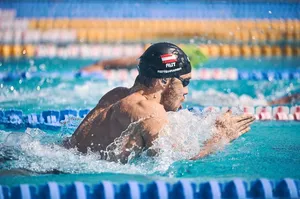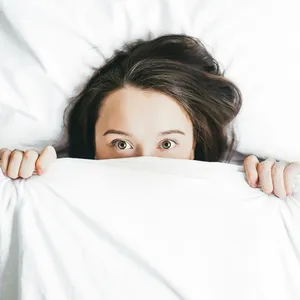Improving Sleep: Why Regeneration in Sports is So Important
Theresa Hauser, MSc. | 08.04.2024

Especially physically active people need enough sleep to be fully productive during the day. Why sleep is so important for performance, and how sleep2 helped two Olympic starters to get more rest at night.
Simon Bucher made it. On February 17, 2024, the Tyrolean won the silver medal in the 100-meter butterfly at the Swimming World Championships in Doha – in 51.28 seconds. A great achievement! Perhaps it helped that he picked up a book in bed the night before. He's been doing that for a few months to distract himself and fall asleep faster. It works. He prefers to read thrillers, even if they sometimes occupy him in his dreams, he says with a smile.
He has also changed other things that make him wake up more refreshed in the morning. The starting point was a project funded by the Austrian Olympic Committee at the Olympiazentrum Oberösterreich, which deals with regeneration and sleep and also uses sleep2.
Sleeping consciously: Success through behavioral change
“I now somehow sleep more consciously,” says Bucher. “At first, I didn't really think about the added value of sleep. I just tried to sleep a lot, especially at noon. Sometimes I would sleep for up to three hours and then feel really exhausted.”
In the project, they learned that power naps should take place in a usual environment (without darkening, covering, etc.) and that the recommended duration is a few minutes up to a maximum of 90 minutes. The best time is between 1 and 4 p.m. The interval to the next training should be at least 30 minutes. “By implementing this and not sleeping as long at noon, I was also able to extend my nighttime sleep duration,” says Bucher. “When I get up more refreshed in the morning, I know it will feel better in the water.
Regeneration: Why does the body need sufficient sleep?
Good sleep is crucial for the body's recovery. For athletes, it can even decide between victory or defeat. During the night, metabolic waste products that accumulate during the day are disposed of. Like adenosine, which makes you tired. Or substances in the brain that also promote neurodegenerative processes such as Alzheimer’s or dementia. The nightly rest period serves to restore a "normal state." During sleep, certain hormones are also released, which control growth, appetite, and metabolism. Furthermore, sufficient sleep helps to consolidate the memory traces of what we have learned during the day. This applies to both so-called declarative content, such as learning vocabulary, and procedural content, such as movement sequences in sports.
Sleep and competition: It's all about every percent
Bucher's roommate, Bernhard Reitshammer, short course European champion in the 100-meter medley in 2023 and, like Bucher, an Olympic participant in Paris, also benefited from the app and the focus on sleep, he says. “I was already aware that good recovery is important for the body. In competition and training, where every percent counts, it's an important topic. But only with sleep analysis and real-time feedback did I manage to bring a system into it. That also motivates me to stick with it. I've become a lot more consistent.”
“Börni,” as he is nicknamed, now tries to go to sleep at the same times. A consistent sleep rhythm is important. He sleeps about seven and a half hours every night and about three-quarters of an hour at noon. “But there's still room for improvement at night.”
Sleep analysis: Real-time feedback and tips for improvement
The app surprisingly showed him that his deep sleep proportion was relatively low during the week. This is the phase of sleep in which the body can recover the most. On weekends, the proportion was longer as if he had to catch up on sleep. “Logically, it would be better to have the sleep when you need it. Not just five days later. My goal now is to increase the deep sleep proportion. It's already increased a bit.”
He also changed his behavior before falling asleep. “I used to really go to bed with my phone and probably spent half an hour on TikTok or Instagram. As a result, I took longer to fall asleep. Now I make sure to distance myself from the TV or digital devices earlier.”
Sleep2 not only measures sleep with high precision, as accurately as no other sleep tracker that analyzes the heartbeat, but also provides individual feedback on the measured values to facilitate behavioral change. All you need to do is wear a sensor at night and pair it with the app before going to sleep. The sensor measures and the app evaluates the data. The result shows the sleep phases (light sleep, deep sleep, REM phase/dream sleep, and wake phase), the time to fall asleep, the nighttime wake time, and assesses sleep efficiency and sleep quality.
Improving sleep: Tips for athletes
Sleep is individually determined and depends on many factors. However, general recommendations can also be derived from the project with the Olympiazentrum Oberösterreich.
What amount of sleep is recommended?
- Under high stress, you should aim for 8 to 9 hours of sleep per night. Your total sleep duration (night sleep and naps during the day) should be between 9 and 10 hours.
- Plan any (daily) naps as if they were part of your training. The duration should be a maximum of 90 minutes, although short naps can already have a positive effect. Sleep during the day between 1 and 4 p.m. and maintain at least a 30-minute interval to the next training session.
Ideally, you should always take your midday naps at the same time and wake up without an alarm clock. This way, you wake up fitter. Set an alarm clock for 90 minutes as a backup.
What sleep rhythm is good?
- Especially the bedtimes should not deviate by more than half an hour.
How can I improve sleep quality?
- A relaxation ritual in the last 30 minutes before going to bed can help you improve sleep quality. Try relaxation music, imaginary journeys in your mind, read a book, or do breathing exercises.
- Don't forget that good sleep already begins during the day. In any case, it is clear: Those who do not sleep well at night will have a harder time achieving peak performance during the day.





